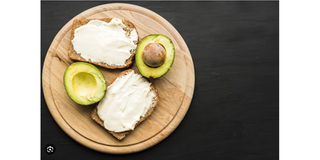Swap unhealthy foods for healthier options

Using puréed avocado as a spread on toast and sandwiches also adds extra vitamins and minerals to your meal. PHOTO | COURTESY | healthline.com
What you need to know:
- Small decisions regarding food choices can have a significant impact on your long-term health. Making healthy food swaps involves making simple changes to your diet by replacing less healthy options with more nutritious alternatives.
We all know we should eat healthier, but sometimes it is hard to know where to start. There is so much information about nutrition and healthy eating, it can feel overwhelming.
But the truth is, making small changes to your diet by swapping out less healthy foods for more nutritious options can greatly impact your overall health and well-being. The key is to start small and make changes gradually.
Trying to overhaul your entire diet at once is a recipe for burnout. Instead, focus on making one or two swaps per week. Over time, these small changes will add up to big health benefits.
White for whole-grain bread
Theodora Kansiga, a nutritionist says white bread is made from refined grains that have been stripped of most of their nutrients and fibre. She, therefore, recommends opting for whole-grain bread instead, which provides more fibre, protein and important vitamins and minerals.
“Look for bread with 100 percent whole-grain or 100 percent whole wheat as the first ingredient. Although brown bread can be bland, with time, the taste will improve and you will even notice that it is more nourishing,” Kansiga says.
Salt for herbs and spices
Salt is one of the most common spices. While it is not a traditional spice derived from plant sources such as pepper or cinnamon, it falls under the category of spices due to its role in enhancing the taste of food. In the culinary world, spices are broadly defined as any substance used to season or flavour food. That tasty steak is mouth-watering not only because of the seasoning used but also because of the salt.
While using salt in moderation is not usually a concern, excess salt intake is hazardous to one’s health. Too much salt raises your blood pressure, which makes it more likely that you will suffer from potentially life-threatening heart problems. Health experts recommend taking no more than six grammes (6,000 milligrammes) of salt per day. One effective method to reduce your salt intake is to explore alternative seasoning options.
Studies have revealed that spicy dishes could be good for your heart. For example, chilli contains capsaicin, a substance also used in anti-inflammatory medicine. Garlic is thought to improve your heart health and immune system.
Ginger is used to treat nausea and calm symptoms in people suffering from joint pain or arthritis. Coriander provides a great source of vitamin K, which is useful for healthy blood and strong bones. Mint has been shown to help people with bowel or digestive problems and sage can help with symptoms of dementia and Alzheimer's.
Garlic is a pungent spice that boosts flavour without increasing sodium content. Therefore, you can reduce the amount Also, to cut back on the amount of salt used in cooking, make use of black paper, a good addition to soups, roasts, pasta, and many other savoury dishes.
Soda for water
Soda is loaded with added sugars and contains a lot of calories with no nutritional value. Swap soda for water which is calorie-free, hydrating, and essential for your health.
“If you miss the fizz, try sparkling water with a slice of lemon or lime,” Kansiga recommends.
Fries for nuts or seeds
Potato fries are high in fat, calories, and salt. Instead, reach for a small handful of nuts such as almonds or walnuts, hard corn (Gweke), and pumpkin seeds. These options provide healthy fats, protein, fibre and important vitamins and minerals.
Ice cream for Greek yoghurt
Ice cream is high in sugar, fat and calories. Swap it for plain Greek yoghurt topped with fresh or frozen fruit. Greek yoghurt is high in protein and probiotics for gut health, while the fruit provides natural sweetness and fibre.
Butter for avocado
Butter is high in saturated fat. Swap it for heart-healthy fats such as avocado. While popular sandwich spreads such as butter, margarine and mayonnaise contain saturated fat, which we know is bad for one’s health, avocado is rich in unsaturated fat, which is good when it comes to keeping one’s cholesterol in check. You can spread avocado onto your toast, sandwich, or wrap.
Processed meat for lean protein
Kansiga says processed meats such as bacon, sausage and deli meat used when making sandwiches, are high in saturated fat, sodium and preservatives. Swap them for lean protein sources such as grilled chicken, turkey, fish, beans or lentils. These provide protein without unhealthy additives.
“The key is to focus on progress, not perfection. When you slip up and have a less-than-healthy meal, do not beat yourself up about it. Just get back on track with your next meal or snack,” Kansiga encourages.




